It’s always kind of been the case with Shinkai Makoto that his movies can be interpreted through many different lenses. From his early days working virtually solo on his Mac, where his work was the virtual private property of hardcore anime fanatics, to becoming the most powerful anime director in the world (that’s an argument to be made at least), Shinkai has always sparked intense feeling. There’s a real irony here in that the man who made his mark appealing to the most inside of audiences wound up taking anime to more viewers outside its circle than anyone since Miyazaki.
After Kimi no Na wa. became the highest-grossing anime film ever worldwide (Sen to Chihiro no Kamikakushi barely held it off in domestic box office), whatever Shinkai did next was going to be one of anime’s biggest event films ever. In some sense, Tenki no Ko is a relatively safe follow-up. This is squarely in Shinkai’s comfort zone (and more importantly, his audience’s) – young romance at its most bittersweet, magical realism, soaring pop insert songs. But in choosing to take on the most pressing issue facing the world (though it’s never treated as such, lacking the immediacy of a pandemic), climate change, Shinkai opened himself to analysis – and criticism – on an entirely different level.
Weathering With You is the story of a 16 year-old from an unnamed island who runs away to Tokyo, Morishima Hodaka (Kotarou Daigo). Hodaka’s backstory – like much in Weathering – is left relatively unexplored. He found island life “suffocating”, but as he’s fleeing to Tokyo by ferry his face is covered in bandages – was he beaten by his father? Bullied at school? On-board ship he takes great pleasure in a freak rainstorm, but is almost washed overboard – only to be saved by a passenger named Suga Keisuke (Oguri Shun). Having seen something of himself in Hodaka Suga-san knows the basic score, here, and offers the boy his business card in case he gets in real trouble in Tokyo.
In many ways, the scenes where Hodaka tries to scrape by in Tokyo are the strongest part of the movie. They feel very real, and one gets a strong sense of Hodaka’s euphoria over being at the center of the world being worn down by grim reality. At his low ebb he hasn’t eaten for three days, and a kindly MacDonalds girl named Amano Hina (Mori Nana) takes pity on him and gives him a Big Mac (both types of Mac are omnipresent in Tenki no Ko – product placement is out of control in Shinkai world at this point). Eventually Hodaka randomly finds a gun a local hoodlum has dropped (which seems unlikely), which he uses to rescue Hina from what looks like an organized enjo-kousai ring (run by the same guy), and winds up taking refuge at Suga’s live-in office.
In this sense, everything is textbook Shinkai, as noted. All his fetishes are here – trains, clouds, snow (eventually), a cat. As opposed to Your Name, Weathering With You turns Shinkai’s impressionistic eye almost entirely on an urban landscape. And this vision of Tokyo is very different from the idealized one in Kotonoha no Niwa. This Tokyo is all about love hotels, rail yards, host clubs, wire fences, and rusted-out abandoned buildings. Visual beauty is pretty much a given with Shinkai-sensei, and Tenki no Ko delivers. If anything, it’s fascinating to see Shinkai use his considerable powers on gritty cityscapes, and they take on a hard-edged beauty that’s something quite different from what we’re used to with him.
Things get pretty complicated from here. Hina has a little brother named Nagi (Kiryu Sakura), who’s a hilariously adept grade-school Lothario, and she’s been lying about her age (including to Hodaka) to get work. She’s supporting Nagi after the death of their mother (wither Dad is another of those missing background details). Suga has a daughter living with his mother-in-law after the death of his wife, and his adult niece Natsumi (Honda Tsubasa) sticks close to him in order to try and keep him tethered to the real world. And then there’s the hook – the strange Shrine on top of an abandoned building in Shinjuku, and the stranger bargain Hina apparently makes there on the day of her mother’s passing.
The mystical conceit behind Weathering With You is going to be one of those YMMV elements, I suspect. Shinkai keeps this all pretty vague – there are mumblings of old priests and fortunetellers and mysterious 13th-century ceiling murals, but the gist of it seems to be that Hina is trading her life for every sunny day her prayers manage to procure. Which is quite a few, after Hodaka sets the trio (with little Nagi as a walking teru teru bouzu) up as a “Sunshine Girl” business. Just why Tokyo is mired in virtually non-stop rainfall to begin with is never really made clear, but this is perhaps mainly done in service of the symbolism which Shinkai is aiming for with Tenki no Ko.
I’ve seen this interpreted in many different ways. Unlike, say, the debate over whether Anno Hideaki’s Shin Godzilla is a pro-nationalist propaganda piece (it is, plainly) Weathering With You’s dots are harder to connect. I don’t think Shinkai intends it as a climate change dismissal, as some have charged. But neither does he seem to be making a profound case for climate action. The words of the old woman Tachibana Fumi (Baisho Chieko) – who seems to be the grandmother of Your Name’s Tachibana Taki (both its protagonists have cameos here) – may come closest to revealing Shinkai’s intent. She talks of a Tokyo of 200 years earlier, before so much of the bay was filled in – “In some ways, it’s just going back to how it was”.
Again, I think this can be interpreted in multiple ways. Hina and Hodaka are making a choice – her life, or a climate that submerges much of the capital. Hodaka, not knowing the truth, believes they can have it both ways. Eventually he does learn the truth, and chooses Hina over the world. Is Shinkai, as some have charged, arguing that it’s better for us to choose the practicalities of the modern world over something we can’t really change anyway? Is he preaching fatalism? I can see the case, but it doesn’t quite resonate with me. I think, rather, that Shinkai is trying to frame global warming through the lens of small heartbreaks – fireworks festival cancellations, rainy days at the park – rather than through slow-motion global catastrophe. He’s asking us to reflect on our place in nature – not resign from it.
To be sure, one could easily take away from Tenko no Ko that Shinkai sees climate change as something beyond our control. Indeed, he does consign much of the power over it to the shadows of Shintoism, and seemingly diminishes our responsibility for it (or at least, for arresting it). One thing he certainly doesn’t offer is solutions – mainly, I suspect, because he doesn’t have any. Maybe that is fatalism, but rather than telling us that we’re powerless, I think Shinkai is telling us to worry about the things we can change rather than the things we can’t.
A further irony, then, is that while this is Shinkai’s most socially-conscious film and that it takes a broadly pessimistic slant in that arena, in terms of romance it’s arguably his most innocent and optimistic. Hodaka and Hina are much more straightforward characters than Taki and Mitsuha, and the obstacles they must overcome – while formidable – much more straightforward as well. There are some definite misses on the plotting side – the whole recurring bit with the revolver and the cops fell flat for me, for example. But I really liked Hina and Hodaka, and I appreciate (as always) seeing actors almost exactly the same age as their characters in this sort of story. Both Kotarou and Mori are wonderful in these roles, and that’s a saving grace for the personal and romantic story in Tenki no Ko.
I won’t say anything so trite as “what you take away from Weathering With You depends on what you bring into it”, but it’s definitely a film that leaves much to the interpretation of the viewer. Strictly as a movie it’s certainly less polished and ambitious than Your Name, but for me it’s also more unpretentious and emotionally honest. I think Shinkai in his last few films is too obviously trying to deliver what he thinks his audience expects a “Shinkai movie” to be. He’s largely succeeded (he’s gotten very good at it) but has lost some of his authenticity and personal touch in the process. Rougher and more awkward, less accomplished than its most recent predecessors, Weathering With You to me feels like a half-step in the opposite direction – and for me, that half-step is a positive one.


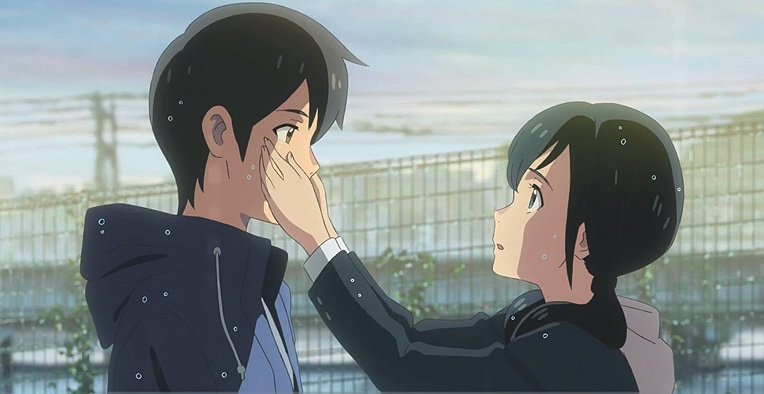




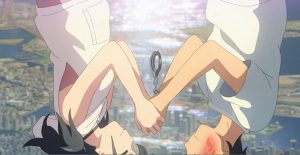

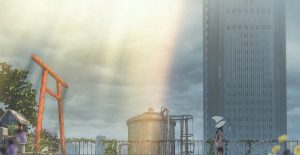
















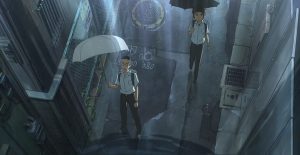
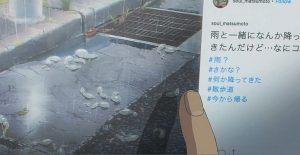

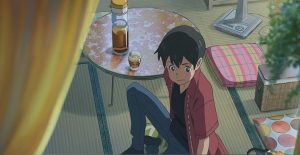
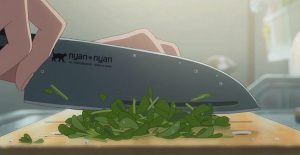


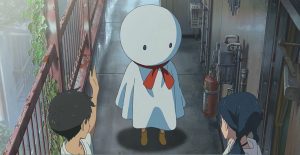

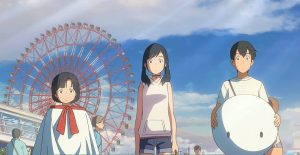




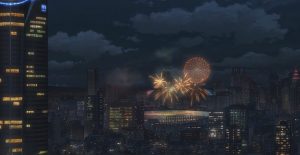

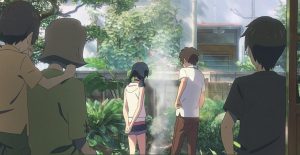

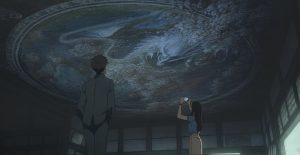

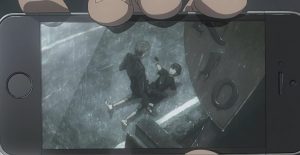
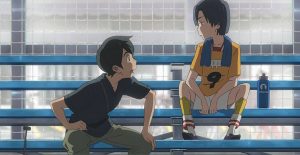
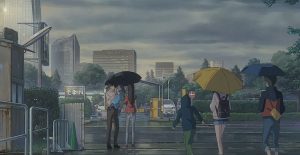


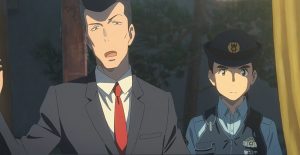
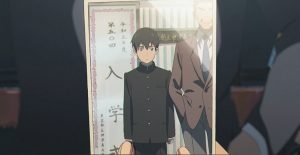

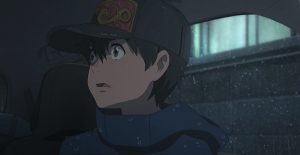
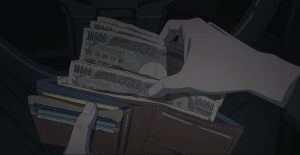







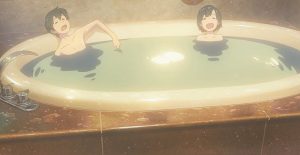






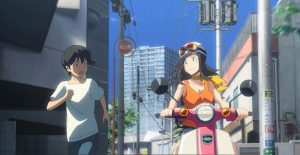
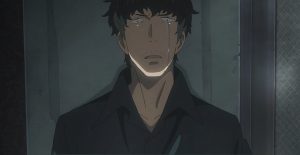

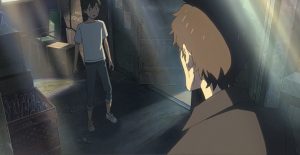










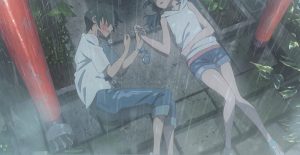
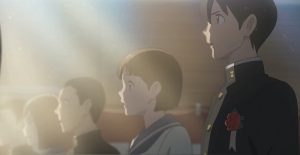
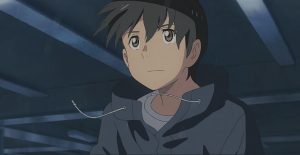


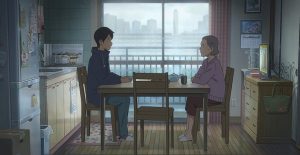

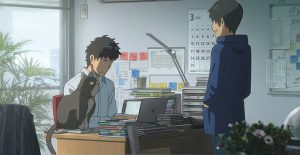

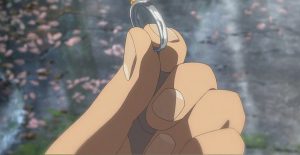

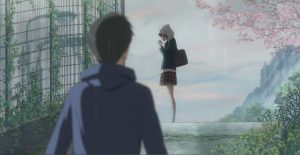
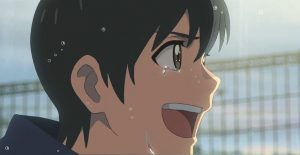







tsirrus
May 12, 2020 at 9:33 amA bit disappointed by this movie. Your Name had a simple plot that was rendered complex by a fantastical element, but never complicated the base storyline.
Here it felt that Shinkai added too many secondary elements and ended up complicating the whole plot. Didn’t like the gun nor the cops. Didn’t understand the gimmick’s (controlling the rain) purpose in the story as it didn’t advance or facilitate anything between the main cast that some non-fantastical gimmick couldn’t instead. The mind-swap of the previous movie added value as it allowed both characters to understand each other.
The art was awesome as always.
Overall I’d place this below Garden of Words or 5cm per Second
Guardian Enzo
May 12, 2020 at 10:05 amI’d place all of them below those two (though Garden of Words and “Place Promised” would be quite close for me).
I think the “gimmick” is here specifically so that Shinkai can muse on climate change. As such I do think it feels a little less organic than the gimmick in Your Name. I also think Shinkai is a bit unsure himself just what he’s trying to say about climate change – which is fine, there’s nothing wrong with artists using their art to ask questions to which they don’t know the answers. The upshot of all that is this movie is less polished than Your Name but, as I said, it does feel a bit more personal and less calculated than his last couple of films.
Nadavu
May 12, 2020 at 10:04 amI read this review very sparsely as I don’t want to spoil the movie to myself, so pardon if my comment is out of place with the actual content. I want to address your point about how Shinkai is trying to deliver what he thinks his audience wants, to the detriment of the end product. I see it a bit differently: In my opinion, Shinkai just never was a very good storyteller, and as he’s becoming more adept at producing “conventional” stories, his movies are becoming more, well, conventional.
Shinaki’s shortcomings at storytelling became apparent with The Place Promised in Our Early Days, his first feature film. Prior to it, in his short films, his idiosyncratic, unpolished style works pretty well. Dialogue is sparse, the situations poignant, and the whole thing is over before it gets too absurd or cumbersome. But with The Place Promised, it just feels like he had a bunch of undeveloped ideas, 90 minutes to somehow spread them across, and very little idea on how to accomplish that. I think you can cut out about an hour of running time and get something very much like an improved Voices of a Distant Star — something of a narrative mess, but emotionally powerful and visually stirring. In its full running time, however, the emotional impact sorts of peters out, and the narrative just kinda collapses under its own ambition.
5cm/s, from that perspective, is The Place Promised done right — it effectively gets rid of any attempt to tell a “story” in the conventional sense, cuts run time to a mere hour, and allows the animation to talk directly to the viewer, without any clumsy plot obscuring the view. It works because it doesn’t try to accomplish what Shinkai didn’t know how to do, and went all ham on what he is the very, very best at: Drawing clouds that break your heart and having his characters reflect that sentiment simply by being rather than performing.
The way I see it, if Shankai was in the business of delivering what his audience wants, he’d just release the same movie again and again from this point on. But the guy had to go and make Hoshi wo Ou Kodomo after that (how can something that looks so good be so painful to watch?). I guess you can view this film as an attempt to go “Full Gibli” and cash in on what anime fans worldwide want, but I find it hard to accept that the 5cm/s crowd was clamoring for something so far removed from what they’ve come to accept from the Shinkai brand. I have no way of knowing, of course, but I’d like to think that he just decided to dare and go beyond his comfort zone and risk again telling a “story” like he did with The Place Promised. Alas, the result was an unmitigated disaster :$
Kotonoha no Niwa was a safe little film, and if I needed to point to a movie that felt like a “Shinkai doing a Shinkai because the people want more Shinkai,” this would be it. But let’s face the elephant in the room; for my money, Kimi no Na wa is a very good movie. Not in the caliber of 5cm/s, but not a bad ambassador of anime at all. But for Shinkai himself, this is pure triumph. He managed to produce a movie that moviegoers anywhere can recognize and enjoy as something that’s a bit different, but also very familiar. For a creator who is so idiosyncratic in his style and who seemed so out of his depths in past attempts, I can’t help but cheer for his accomplishment. I don’t know if anyone expected such competent storytelling from a man who botched it pretty terribly in the past. So I don’t see it as him pandering to his crowed, but rather as him developing his skills.
Whether I personally like his transition into a more mainstream filmmaker is an entirely different issue, though.
Guardian Enzo
May 12, 2020 at 10:16 amThanks, great comment. Just a couple of thoughts if I may…
I don’t disagree that Shinkai’s weakness is as a storyteller – which is to say, connecting the dots in the stories he creates. 60 minutes or less seems to be his butter zone, though I did like Place Promised more than you. But I don’t think I can say Shinkai isn’t a very good storyteller, because what 5 CM is doing is very much storytelling. It’s more than gorgeous images, though those are certainly vital – it’s just not conventional storytelling, and that’s where Shinkai is weak. Which is why, to me, his two commercial blockbusters lack authenticity even if they have more polish. And why, paradoxically, I think I like Tenki no Ko the better of them – it’s less inauthentic because it’s less polished, and it feels like Shinkai is at least trying to make a personal statement (even if it’s a bit garbled).
Kotonoha no Niwa is, to me, not Shinkai trying to create a “Shinkai movie” to satisfy his audience’s expectations, but the movie where he figured out what a fully commercial Shinkai movie was and perfected it. Rather than copying himself, to me it’s the template he’d later set about copying. And I like it very much – it’s odd and quirky in a way that Shinkai movies always benefit from, and his more recent films are not.
As for Hoshi, that was something far worse than copying yourself – it was a blatant attempt to copy not just Ghibli, but Miyazaki. At least when Shinkai is self-plagarizing he’s being true to himself in a sense; that’s not the case here. It’s a real shame because the movie looks fantastic, but narratively it is a disaster. It represents, to me, a really awkward attempt to transition from “indie” to “major label”. It was a transitional film and he got it out of his system – all good.
Nadavu
May 13, 2020 at 8:02 amYes, you hit the nail on the head there (cocky nail, shouldn’t have stuck out like that!) — it’s the conventional aspect of storytelling that was Shinkai’s glaring weakness. What I wonder about is why you feel that KnNw is inauthentic. Would you have felt that way if it wasn’t a Shinkai movie? Is it the movie itself, or is it the fact that it wasn’t what we’ve come to expect from him?
Guardian Enzo
May 13, 2020 at 9:52 amIt’s very by the numbers for me. The hook, the romance, the art. Gorgeous, slick, polished – it just feels very impersonal, like there’s nothing in it that Shinkai is urgently trying to say.
raikou
May 12, 2020 at 12:13 pmFinally, Tenki no Ko Review!
I, too, at first am confused about what Shinkai was going for with this movie. In the end, I don’t think about it much.
It is a bold choice of an ending though, to choose the girl over the world.
One of the main gripes about this movie is Hodaka doesn’t really get his backstory. Which makes his characterization lacking. I put this movie is little better than Kimi no Na Wa, although I still consider both of them about average. I used to love Shinkai pre-Kimi, because his storytelling with character relationship is amazing. Since Kimi no Na Wa, I think he changed his focus and chose to more safe route/pleasing the fans, and that decreases the quality of his movies. He gets more worldwide fans with this route, though.
5cm was my favorite, I really like Place promised in our early days, and his peak IMO was Kotonoha no Niwa. It only has 30 minutes and yet it’s the most fulfilling story.
Kiminonawa and Tenki wasn’t a bad movie, I just doesn’t think it’s GOAT material, just standard good. I was kinda disappointed him taking the mainstream route, the romances written in these two movies are clearly inferior to his past works.
Here’s hoping Shinkai would make the next movie even better. What you said about more positive half-step might be right.
Anyway, great review as always, Enzo.
Guardian Enzo
May 12, 2020 at 12:47 pmThank you. I’ll always hope Shinkai has another masterpiece in him – he’s certainly capable of it. Especially with Hosoda on a bit of a downward trajectory and Hara Keiichi not doing anything on the level of Colorful since, anime needs a few more theatrical masterpieces badly.
I really believe a singer-songwriter or band that hits it big is a useful metaphor for Shinkai’s career. And he’s trapped in the same box a lot of those people are once they’re being paid huge sums of money and expected to deliver a product that will earn it back for the people paying it.
kanda92
May 12, 2020 at 5:06 pmI watched this and “Your Name” a while ago, and reading your review and looking back on the character analysis, to me while Hodaka and Hina were not as developed than Taki and Mitsuha, “Weathering With You” does have a more interesting supporting cast.
Yann
May 14, 2020 at 12:35 amThe last movie I saw in an actual theater… Different times.
Guardian Enzo
May 14, 2020 at 8:59 amNot an optimist, eh? ;-P
Miyu Fan
May 14, 2020 at 11:26 amI really have no problem about Hodaka choosing the girl over the world, because that’s what a normal 14 year old boy will choose and honestly it’s not fair to sacrifice someone for the sake of the whole world. Of course the movie tried to justify it by saying climate change is unavoidable anyway. Shinkai could have framed it as climate change is just the nature’s way of taking revenge at humans polluting the Earth which would have come across better, but maybe he didn’t want to be that controversial I guess.
I do feel weird seeing Shinkai being treated as this famous anime director, and I do feel annoyed that in TV shows and interviews they only focused on Your Name and Weathering with You and ignored his previous works before that. But well I guess that’s the price of popularity of Your Name.
Christian Gin
May 15, 2020 at 3:36 amAm i the only one who finds Your Name to be overrated? It doesn’t feel like a mind-blowing story and it’s only great if you truly know Shinto context. Lots of things not explained, confusing plot points.
This film resembles its predecessor, which hurts a lot of people reviewing it thinking they’re nearly one in the same. I liked the realism or a few things that were better explained than the previous one.
Guardian Enzo
May 15, 2020 at 9:09 am“Overrated” is a loaded term. When you consider that by some standards like box office and aggregator scores it’s among the top anime (or the very top) ever, sure, it’s overrated. I don’t think it’s a masterpiece; I don’t think it’s Shinkai’s best work. That doesn’t mean it’s not very good.
Anchen
May 16, 2020 at 12:28 amFor me personally, Your Name when I first watched it was a culmination, or payoff for most of his previous movies which always had a bittersweet ending at best. So that was my context at least for why it was such a big hit for me when I saw it at its world premiere at Anime Expo. It did help that the room was full of other Shinkai fans who also had a lot of the same trepidation based on his previous works. It did play on a lot of his previous notes, although I thought it was executed well, and as always for his pieces it looked great.
That being said, now that there was a payoff, I did feel a little disappointed with Weathering With You because it did go over a lot of the same beats, and it didn’t have that sort of cathartic “payoff” moment since you can’t really get that a second time. I did enjoy the movie though, since it was still pretty to look at, and I thought the side characters were actually quite nice and felt more like full fledged side characters rather than bit players. I waffle a bit back and forth on how I feel about Hodaka, ranging from, god this guy makes some horrible choices, to understanding that he had some issues back home (even if they aren’t really fleshed out), and that he is still a teen, and basically a kid. It does make him a more interesting character though and one who I think his decision ultimately makes sense.
Guardian Enzo
May 16, 2020 at 10:02 amHeh, I was at that same screening and it was quite an experience. That was the toughest ticket at AX that year, even on a press badge.
The thing is, for me it felt as if Your Name was a calculated attempt by Shinkai to give his fans exactly what they wanted A-Z, including that payoff you describe. It felt like he’d been taking notes on what fans complained about in prior works and made a checklist. It’s thorough and slick and exceedingly well-done – but in the end, it played as calculated for me. I found that to be less true with Weathering With You, even if it did stylistically cover a lot of the same ground.
Also – please bring back some of the piano BGM and dial back the pop insert songs. And for Goc’s sake, tone down the product placements.
Krize
May 16, 2020 at 2:16 amHey Enzo, this isn’t relevant to the topic at hand, but since a couple of other big names in film animation have been discussed I figured I would ask: How do you feel about Oshii Mamoru’s work in the space? I personally count Beautiful Dreamer, the second Patlabor movie, and GITS all as extremely good, wonderfully cerebral films (I love Jin-Roh too but I consider it distinct from his other animated works for a couple of reasons) but I know his directorial style has its detractors. Just kinda curious where you fall on that topic.
Guardian Enzo
May 16, 2020 at 9:58 amAdmire more than love. A great technician who often leaves me cold.
Flower00
June 12, 2020 at 1:35 amGreat write-up! I personally would say that the film isn’t a climate-change motivated one, the themes are a lot more focused on people. It’s a little sad that the discussion of Tenki no Ko is so rare amongst the anime community. Besides your review, there was only one other blogger who wrote about Tenki no Ko in any detail that I could find. I find that reading perspectives from bloggers are way more valuable than those from larger news sites, since it offers a much more sincere bit of insight into the film.
Guardian Enzo
June 12, 2020 at 10:57 amThank you for those kind comments. I would say one reason why the film gets discussed in those terms is because Shinkai himself noted that he wanted to make a film about climate change. I’m just not certain he knew exactly what he wanted to say about it.